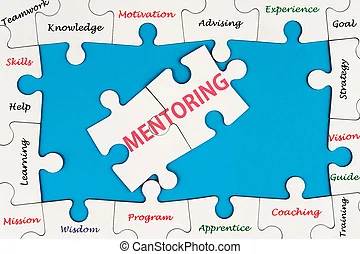Mentoring has evolved to embrace range of activities where an external individual responds to queries, extend moral support and counselling to the mentee as needed.
Mentoring is: support and encourage people to manage their own learning in order that they maximise their potential, develop skills, improve performance and become the person they want to be. Some key characteristics of mentoring are:
- it is non-directive
- responsibility for outcome lies with the mentee
- build confidence, be realistic, helps maximise potential, develop skills, improve mentee performance enabling growth and development of the mentee
- A mentor helps grow your skills, make better decisions, and gain new perspectives on your life and career. Mentor leverages her/his experience to guide the mentee on career or life. Mentor is a person you can look to for direction
- Role of a mentor is to put all the experience they’ve accumulated throughout their career and life for the benefit of the mentee. In a mentoring relationship, both the mentee and the mentor learn from the relationship.
Mentoring vs Coaching
There is a shade of difference between Mentoring and Counselling: if a mentee has emotional difficulties he/she will need a trained counsellor to provide them with emotional support in addition to a mentor, or will simply need counselling.
Mentoring isn’t coaching either. Mentors offer some of their life experiences and knowledge to help mentees, not being directive or taking control of the relationship. Coaching is structured sharing of experience and knowledge. The dividing line is thin
Skills involved in mentoring, coaching and counselling have a huge overlap, of which empathy, listening and asking questions are key.
Driving guidelines of mentoring
Good mentoring is discipline-agnostic. Whether you’re a mentor to a medical resident or marketing manager, same guidelines apply
Mentorships are more like the relationship between a parent and adult child than between a boss and employee: characterized by mutual respect, trust, shared values, and good communication.
A mentee should be curious, organized, efficient, responsible and engaged. Commitment, organization or motivation of mentee are necessary to succeed
Expectation management, convergence and consensus are key to success of mentor-mentee relationship. Successful relationships are ones where the mentee fully understands and shares their mentor’s vision for success.
Mentor and mentee to have a disciplined. Mentees must respect mentors’ effort and time. Essential mentee behaviours include clzrity of purpose of meetings and assuring mentors have adequate time in advance to review any related materials. Mentee to understand that they expect and welcome constructive criticism.
Gaining new perspectives
While the mentor is usually in the position of imparting knowledge to the mentee, a mentoring relationship can also help the more experienced employee learn new skills. It’s common that younger employees take on the role of reverse mentoring to share technological advances, trends, or sharpen their digital skills.
Some desired qualities of mentees and mentors are:
- Drive to succeed
- A positive attitude
- Good time management skills
- Open to learning and new perspectives
- Clear communication
- Initiative
- Leadership skills or capabilities
Key expected take-aways from mentoring, for the mentee are
- Confidence building
- Access to trusted, open, experienced and matured individual to share one’s ideas, concerns, options, emotions and get an informed feedback from wisdom, not merely knowledge
- Understanding practical / impractical nuances of what is learnt in theory, a mentor helps to bring to surface shortcomings and misunderstandings in theory and bridge the gap / moderate ‘theoretical’ judgments
- Mentor helps introspect / revisit misplaced perceptions, understandings from peer groups / media with practical value
- Mentor helps understand and bring to surface cross functional implications of actions based on isolated theoretical considerations; bring meaningful value driving desired holistic outcome
- Help introspect misplaced understanding from pronounced public perception or peer groups or loud heroic individuals looking for vsibiity and social acceptance or noisy media
- Correct misplaced perceptions such as: you have to be loud to be heard or listened to, you have to be unpleasant to someone to win over that person, every time you win there has to be a loser, you have to mislead someone to get him/her to follow you, leadership is belittling others … to be patient is lacking initiative or drive, to have own views means one is a deviant or breaking rules or conventions, to be a hero you have to have a crowd of followers, your boss is always right, you get punished for following your own path or conviction …..
- Mentoring helps learn what is never available in books, online / offline courses or classrooms
- You learn from someone who has been through it, done it, learnt from mistakes, become wiser, realistic and more balanced
- A mentor listens to you, after understanding you, takes you through your problems, guides you and works with you to resolve it
- A mentor is not a criticiser, your boss who sits on your head, has his own agenda and uses you as a tool to fulfil his agenda
- A mentor is non judgmental, allows you to experiment, can be critical to help you introspect
- A mentor is a matured friend you can confide in without concerns of any hidden agenda
- A mentor is non selfish and gives out himself fully to be of help to you
- A mentor prewarns you on potential fall outs of your actions so that you are prepared if things fall off track
- A mentor is a matured sounding board before you put your ideas into practice
- A mentor prepares you to be prepared for consequences of your bold actions
- A mentor is not accountable for outcome of your actions
- A mentor’s job is confidence building, prewarn, be a souncidng board or shoulder to lean; but not accountable for outcome of what the mentee does
- Outcome of mentoring effort is decided by the mentee on how much he/she has gained in terms of confidence, avoiding costly mistakes, how much of prewarning on potential expensive outcomes, preparedness, visibility into future, be realistic in judgment and prewarning on expensive goofups, avoid wrong paths, be more realistic ….
- Mentor shares his wide base of knowledge to enhance breadth of exposure of the mentee
- Mentor’s value derives from how much confidence and maturity he has been able to instill in the mentee
- Mentor can help in build valuable networks for professional advancement / business growth
- Mentor brings in a sense of realism in what are otherwise ‘celebrated goals to achieve’. Mentoring is a practical link between learning in a classroom context and real world environment that is in a state of constant flux
- Mentor helps mentee take a practical long term view of their actions and prepare for likely surprises
- Mentoring helps build maturity in identifying and pursuing goals, evaluating options, prepare for consequences and develop emotional balance
- Mentoring helps demystify fictitious theoretical understandings, fill the gap between theory and reality, and even challenge some of the theoretical concepts that evolves with time and constant shifts happening in business ecosystem, practices, learnings and even irrelevance of outdated concepts in a changing world
- Mentoring is learning from someone elses’ good and bad experience without paying the price for that learning
- Mentor is a sounding board for ideas and helps build on it holistically and realistically
- Mentor Mentee is not a paremt child or teacher student relationship, but between trusted friends who learn from each other and add value to their ideas in pursuit of a goal
- Mentor is not necessarily more intelligent or more educated than the mentee, but one who carries wide, long, good and bad experience from which the mentee can learn, to pursue his/her own goals

